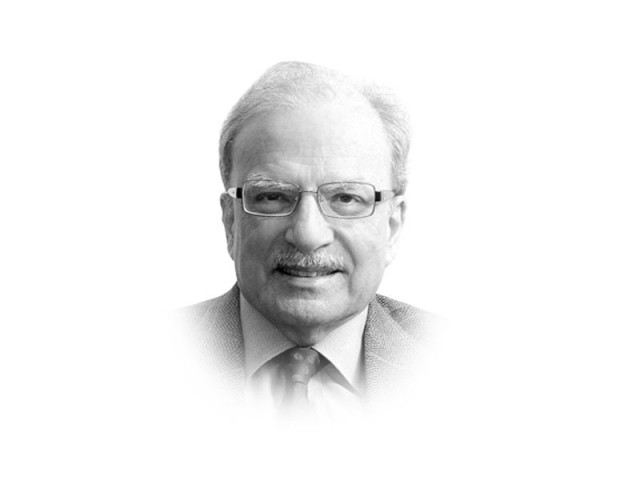Trump’s challenge to the system of global commerce
Washington has brought the world to the edge of a trade war

The writer is a former caretaker finance minister and served as vice-president at the World Bank
One of the assumptions behind that line of argument was that the world trade system would remain open, that the obstacles to international commerce would continue to be lowered and that an international body that spoke for all member countries rather than for those that were more powerful ones would serve as the forum where trade disputes would get resolved. Pakistan, along with other developing nations, had benefited from these developments in the management of international commerce. For instance, the Multi-Fibre Agreement (MFA) that had limited the export of cotton and synthetic fabrics and made-up goods from countries such as Pakistan was abolished as a result of international efforts. With the MFA gone, Pakistan could have — in fact should have — expanded its textile sector and made it into a more active player in both the global and domestic economies. That did not happen because of the absence of an export-friendly domestic public policy. And now Pakistan must contend with the upending of the international system because of the way the administration headed by President Donald Trump is handing the United States’ participation in global commerce.
“President Trump appears to unravel 70 years of painstaking efforts that the United States has led to build an international system of trade based on mutually accepted rules and principles,” wrote The Washington Post in the opening paragraph of its long assessment of the damage Trump’s policies were inflicting on the international trade system. Since he took office in January 2017, the American president has made several moves upending the system his country had taken the leadership to build. One of his first acts was to pull his country out of the Trans-Pacific Partnership agreement negotiated over a period of two years by his predecessor in the White House, Barack Obama. The administration is renegotiating the North American Free Trade Agreement (Nafta), threatening to pull out altogether if Canada and Mexico, the other partners in the pact, don’t accept Washington’s demands. Among them is the provision that the agreement would be renegotiated every five years. Such an approach would introduce an element of uncertainty that agreements such as Nafta are supposed to eliminate. By the end of May 2018, the Trump administration had begun to deploy its threat to impose tariffs on imports into the United States to force the country’s trade partners to accept the conditions Washington would use to conduct international trade.
Trump and his trade advisers have argued that the government is trying to get other nations, especially China, to play by Washington’s rules, believing that the trade agreements negotiated in the 1990s were due for an update that better reflects the realties of the state of the global economy. “When you’re almost $800 billion down on trade, you can’t lose a trade war!” tweeted the president on June 2, once again going with a number that suited his purpose. The overall trade deficit, which includes services, was $566 billion in 2017. “The US has been ripped off by other countries for years on trade, time to get smart!” the presidential tweet continued.
This angry statement was prompted by the reactions in Canada and Europe that Trump was imposing a 25 per cent tariff on steel imports from Canada, the European Union and Mexico and 10 per cent on aluminium coming in from the same sources. That was only a start. Trump has threatened to go after the imports of cars into the United States. The expected reaction from the affected countries was quick in coming. France, Germany, Mexico, Canada, Japan and Turkey announced plans to launch countermeasures. Washington had brought the world to the edge of a trade war.
There was near-consensus among trade experts that Trump’s moves would hurt the World Trade Organisation and diminish the organisation’s authority in trade matters. This is where countries such as Pakistan would lose if they were to gear up their export sector in shaping the domestic economy. “To me, it’s unequivocal that these US tariffs are a violation of the America’s WTO obligations,” said Jennifer Hillman, a Georgetown University law professor. “Under the WTO, the US is committed to not discriminating among members of the WTO, so the US can’t charge a 10 per cent tariff on Canada but not on Argentina.” Past American presidents worked hard to get other nations to join the WTO and adhere to the system that barred the arbitrary use of tariffs and other constraints to the flow of goods and services. It was, for instance, behind the move to get China to join the WTO. Now, the United States will face numerous challenges in the WTO and if it loses, which is likely, Trump may simply pull out of the organisation. If that were to happen, he would have destroyed an important pillar of the global economic structure that was built over a period of half a century.
Published in The Express Tribune, June 11th, 2018
Like Opinion & Editorial on Facebook, follow @ETOpEd on Twitter to receive all updates on all our daily pieces.
.
















COMMENTS
Comments are moderated and generally will be posted if they are on-topic and not abusive.
For more information, please see our Comments FAQ